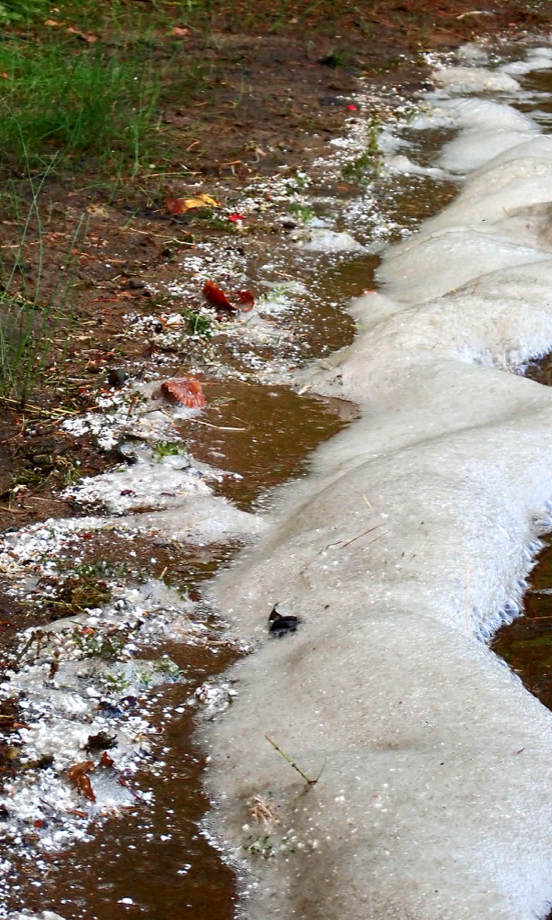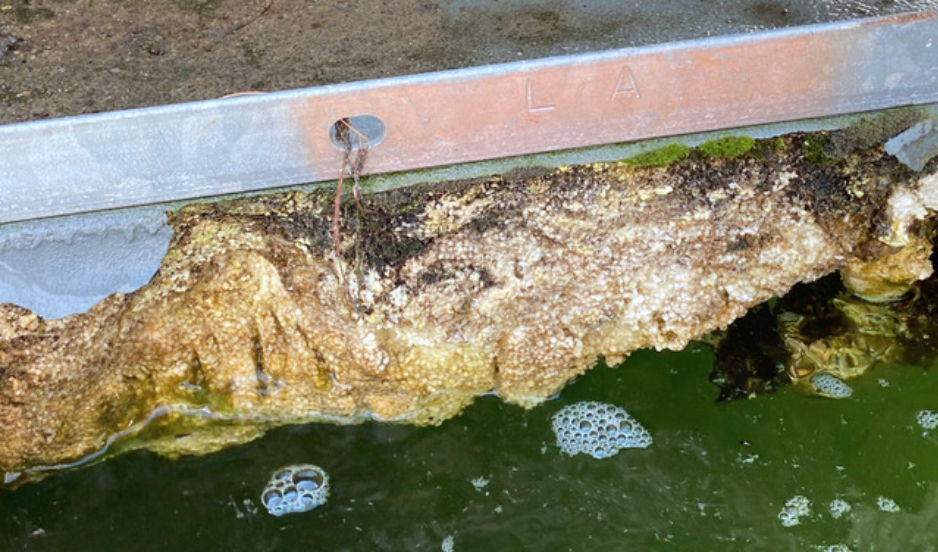October 2021
MLWA, “Looking At The Mirror” Column for LPN
Many Mirror Lake Docks Threaten Our Health
by Sandy E. Bissell
It is a total mystery why expanded polystyrene food containers would be banned in communities all over the world, including NY State as of Jan.1, 2022, and yet the exact same product can be used by individuals and businesses to keep their docks afloat in what might be considered pristine waters, even here in our supposedly protected Adirondack Park.

Expanded polystyrene is the generic name for that brand many people know as Styrofoam. Pound for pound, it is good at keeping things from sinking. It is lightweight and cheap. But that’s only the down payment because as it is exposed to the environment, this type of foam breaks down into tiny particles that float off into the water and end-up everywhere, and the cost to our environment is immense.
You will find these microplastics floating all over the surface of the water, collecting at the water’s edge, blown-off onto the surrounding shoreline, caught in reeds and grasses, and in the bellies of birds and fish. You may even consume some when you enjoy that lake trout you caught this afternoon or while dining out at a local restaurant. The chemicals these tiny particles contain are carcinogens and endocrine disruptors that end-up in our water systems and bodies, as well as the bodies of those fish, birds, and mammals that live in or near the water.
“Styrene is asuspected carcinogen and neurotoxin which potentially threatens human health. Due to the physical properties of polystyrene,” the EPA states, “… such materials can also have serious impacts on human health, wildlife, the aquatic environment and the economy.” We should be paying better attention.
Polystyrene foam comes in two forms: expanded (EPS) and extruded (XPS). Both types are used as flotation for docks, but neither should be used unencapsulated because of their tendency to breakdown when exposed to just about everything they will be exposed to while keeping docks afloat: sun, water, waves, ice, boat gas — and on our Adirondack water bodies, mink and muskrats. Ideally, polystyrene in any form should be banned everywhere because not only is it toxic, it’s non-biodegradable which means it will be with us forever. Recycling is impractical due to the low value and difficulty transporting it plus the sparsity of recycling centers that accept it. At this time, polystyrene foam is a major pollutant worldwide, wreaking havoc on a wide range of living organisms in our oceans and our landfills. Some estimates assign polystyrene 30% of our landfills and 90% of our ocean debris.
There are other ways to make a dock buoyant, but the least we can do if we find ourselves needing to use polystyrene foam, is to make sure it cannot escape by encasing it in an impervious material. It is common to see hard plastic shells used for this purpose. They are slightly more expensive at the outset, but over time they make a good investment because they last much longer than fragile, unprotected polystyrene foam. They are more attractive too.

Presently, on Mirror Lake there are numerous docks supported by unencapsulated, polystyrene foam that are owned by individuals and businesses. Included in this group is our own Village Beach swim dock. The Village Board has applied for a LEAF grant from the Regional Office of Sustainable Tourism (ROOST) to pay for improvement of our dock, and those grants are awarded in November. This should be a priority for our community with or without a LEAF grant.
The Mirror Lake Watershed Association has been making an inventory of these properties, and the owners will be receiving letters in the near future requesting their help in addressing this serious issue. It’s been almost a year since the Adirondack Daily Enterprise reported that, “The Village Board of Trustees is exploring the idea of crafting legislation that would restrict the use of un-encapsulated polystyrene docks on local water bodies.”

Hopefully, eventually, our new Town code will make these deteriorating docks a violation so that we can be responsible caretakers of this special part of the world. In the meantime, we should willingly do this for the sake of our waters, our wildlife, and our future generations.
To learn more about the Mirror Lake Watershed Association’s volunteer efforts to protect Mirror Lake and Mill Pond, go to mirrorlake.net or join us for our monthly meetings at 5 PM, the second Monday of each month, on the second floor of the public beach house.
